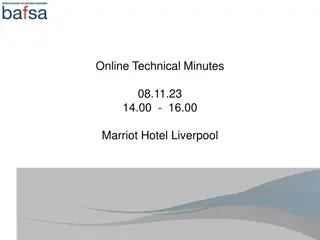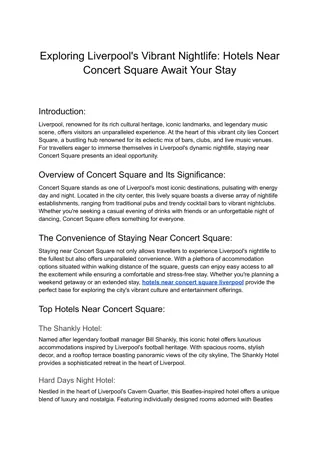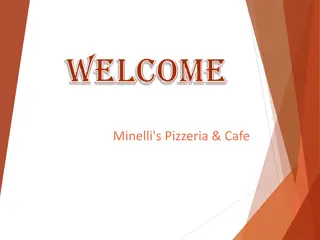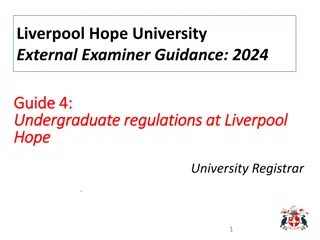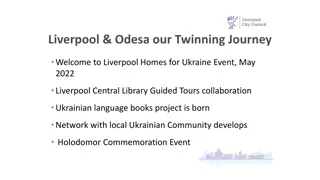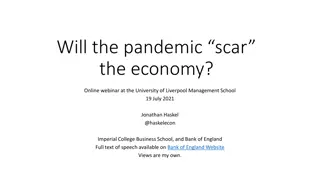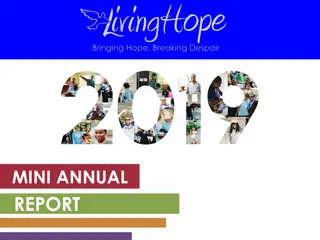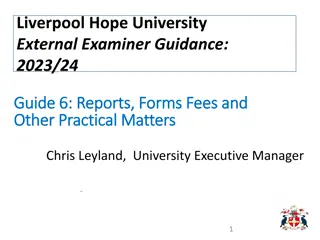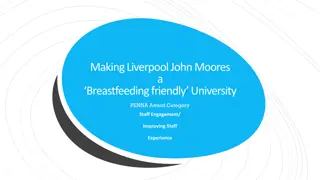Liverpool Hope University Overview
Liverpool Hope University is an ecumenical Christian foundation offering a unique academic community rooted in Catholic and Anglican traditions. With a focus on personalized learning and collaboration with like-minded institutions, it provides undergraduate and postgraduate programs in a small, inclusive, and diverse environment. The university's distinctiveness lies in its high proportion of female students and dedication to recruiting from disadvantaged backgrounds.
Download Presentation

Please find below an Image/Link to download the presentation.
The content on the website is provided AS IS for your information and personal use only. It may not be sold, licensed, or shared on other websites without obtaining consent from the author.If you encounter any issues during the download, it is possible that the publisher has removed the file from their server.
You are allowed to download the files provided on this website for personal or commercial use, subject to the condition that they are used lawfully. All files are the property of their respective owners.
The content on the website is provided AS IS for your information and personal use only. It may not be sold, licensed, or shared on other websites without obtaining consent from the author.
E N D
Presentation Transcript
Liverpool Hope University External Examiner Guidance: 2024 Guide 1: Guide 1: The University and its Programmes The University and its Programmes University Registrar 1
Liverpool Hope: in a Nutshell Ecumenical Christian Foundation, open to those of all faiths and none: o the only ecumenical University in Europe. Roots in Catholic and Anglican teacher training colleges, founded in the mid nineteenth century: o combined as a sign of hope in 1980s. Currently has eight academic Schools and two Departments. From 2024/5 the Schools/Departments will be reorganised into four Faculties. 2
Liverpool Hope: in a Nutshell Very focussed on unique mission and vision: o weekly Foundation Hour ; o aim to fulfil Newman s concept of a collegium an academic community of scholars providing a nurturing environment to stimulate and foster the scholarly advancement of all its students, working with and through them to create participants in learning (rather than recipients of learning) and to engender personalised learning (rather than mass teaching); o collaboration with institutions sharing comparable vision, some courses delivered at Holy Cross Catholic 6th form College in Bury Newman University and Maryvale Institute prepare students for Liverpool Hope research degrees. 3
Liverpool Hope: in a Nutshell [d] Based at 2 attractive campuses in Liverpool: o Hope Park; o Creative Campus [Creative and Performing Arts]. Deliberately remained small 5200 FTE: ~4400 undergraduate; ~1350 taught postgrad [incl. graduate initial teacher training]; ~140 postgraduate research; 4
Our Courses: in a Nutshell Undergraduate: o 53% single honours; o 39% combined honours; o 8% initial teacher education. The proportion of Hope students selecting a combined honours route is significantly above the UCAS national average of 9%. Taught postgraduate: o 48% Masters etc; o 52% PGCE etc. 5
Distinctiveness Distinctiveness Hope has a distinctive cohort shape, with a significant majority of female students. The University is an inclusive and diverse community that consistently exceeds its benchmarks for recruiting students with a disability, or from areas of high deprivation and low participation. The interventions detailed in the Access and Participation Plan are designed to ensure the success of students in these groups at Hope. 6
Our Courses: undergraduate [a] Not modular or semesterised: aim to move beyond fragmentation of learning (often associated with a modular curriculum structure) to having a rounded formation of the graduate in the discipline; all students in a discipline have, as a minimum, an underpinning common experience / pattern of provision, so relatively few options usually none before Level 6; each level of study explicitly builds on the previous one; all courses year-long , enabling assessments to require students to synthesise across the year. 7
Our Courses: undergraduate [b] Standard curriculum structure [some variations exist see next slide]: o Level 4 [ Certificate or C ] 2 60-credit blocks [typically Introduction to .], Single Honours: Two Core blocks; Combined Honours: One Core block from each Subject. o Level 5 [ Intermediate or I ] 2 60-credit blocks [typically Explorations in .,], as for 4[C], o Level 6 [ Honours or H ] 2 45-credit blocks [typically Advanced Studies in .], as for 4[C], 1 30-credit research block made up of either: Single honours: Dissertation Combined Honours: either 2 Research Projects or Integrated Dissertation combining both subjects. 8
Our Courses: undergraduate [c] Some variations to the common structure: o 120-credit blocks at 4[C] and 5[I], and 90-credit taught block plus a research block at 6[H] BA Social Work , BA Primary Education , BA Creative and Performing Arts; o additional non-credit-bearing placements or professional practice BA Social Work , BA Primary Education, 9
Our Courses: undergraduate [d] Common learning, teaching and assessment pattern [adapted as appropriate by each discipline]. o Students typically experience, each week, for each block . lectures [typically leading to end-of-year exams]; small group tutorials [with tutorial activities leading to assessed work]; seminars [leading to coursework assessments]. o At Level 6 tutorials are often replaced by meetings with supervisors of Dissertations and Research Projects. 10
Our Courses: undergraduate [e] Incoming Study Abroad / Exchange o Students at Hope for the full year usually do standard academic blocks. o Students at Hope for part of the year do specially approved modules adapted from the blocks, with a special assessment pattern. You may be asked to approve a module for such students. Integrated Masters Students are usually admitted at Level 4[C]. And continue to study into Level 7[M] Bachelors degree with Foundation Year Students are admitted to Level 3 [F] and continue through to Level 6[H]. 11
Our Courses: Masters degrees and constituent Certs and Dips [a] Standard credit structure: o 180 credits Masters, 120 PGDip, 60 PG Cert, o A minimum of 150 credits must be at Level 7 [M], with up to 30 at Level 6 Masters degrees typically take 1 year full-time or 2 years 1 term part-time. o Some professional courses can take longer due to placements. 12
Our Courses: Masters degrees and constituent Certs and Dips [b] Modular structure but broad philosophy shared with u/g: o each degree has a core [at least 60 credits] taken by all students and exclusive to that degree; o Level 7[M] research methods must be explicitly covered, and expectation that this is embedded in the curriculum, not taught in isolation; o each degree inducts students into the scholarly academic community and/or the relevant professional area, culminating in one or more substantial pieces of independent work [such as a dissertation]; o each degree involves ever deepening knowledge, understanding and critical reflection, not merely the accumulation of further credits; o students can take a double major masters , comprising 60 credits in each of 2 subjects plus an integrated Dissertation. 13
Our Courses: PGCE etc 60 academic credits at Level 7[M] plus professional work School Direct and SCITT arrangements mean that professional work is handled by a partner school. Only the academic elements are awarded by Hope for SCITT arrangements. 14
And finally We hope you have found this presentation useful. If you have any queries please email Dr Cathy Walsh walshc@hope.ac.uk [University Registrar]. 15











